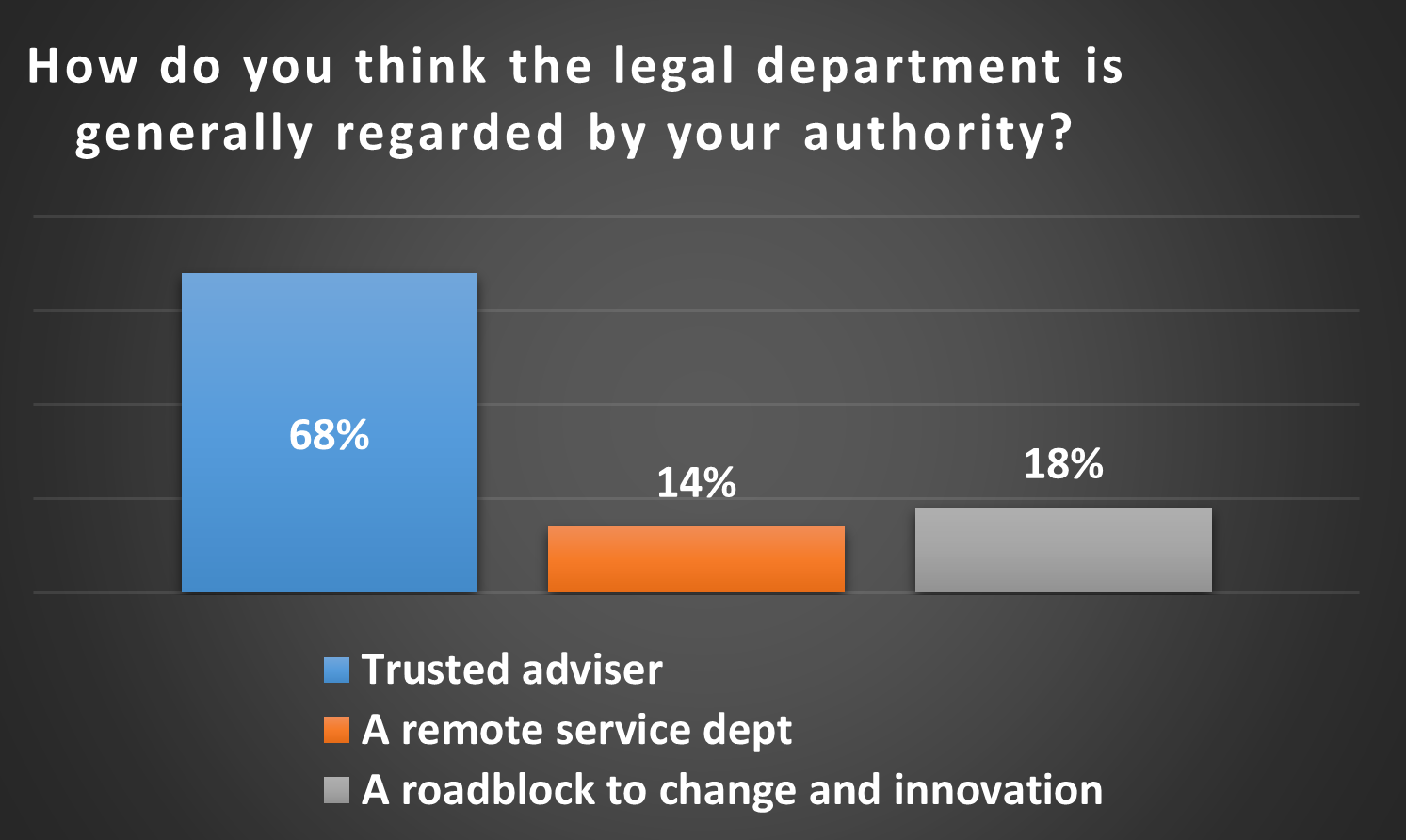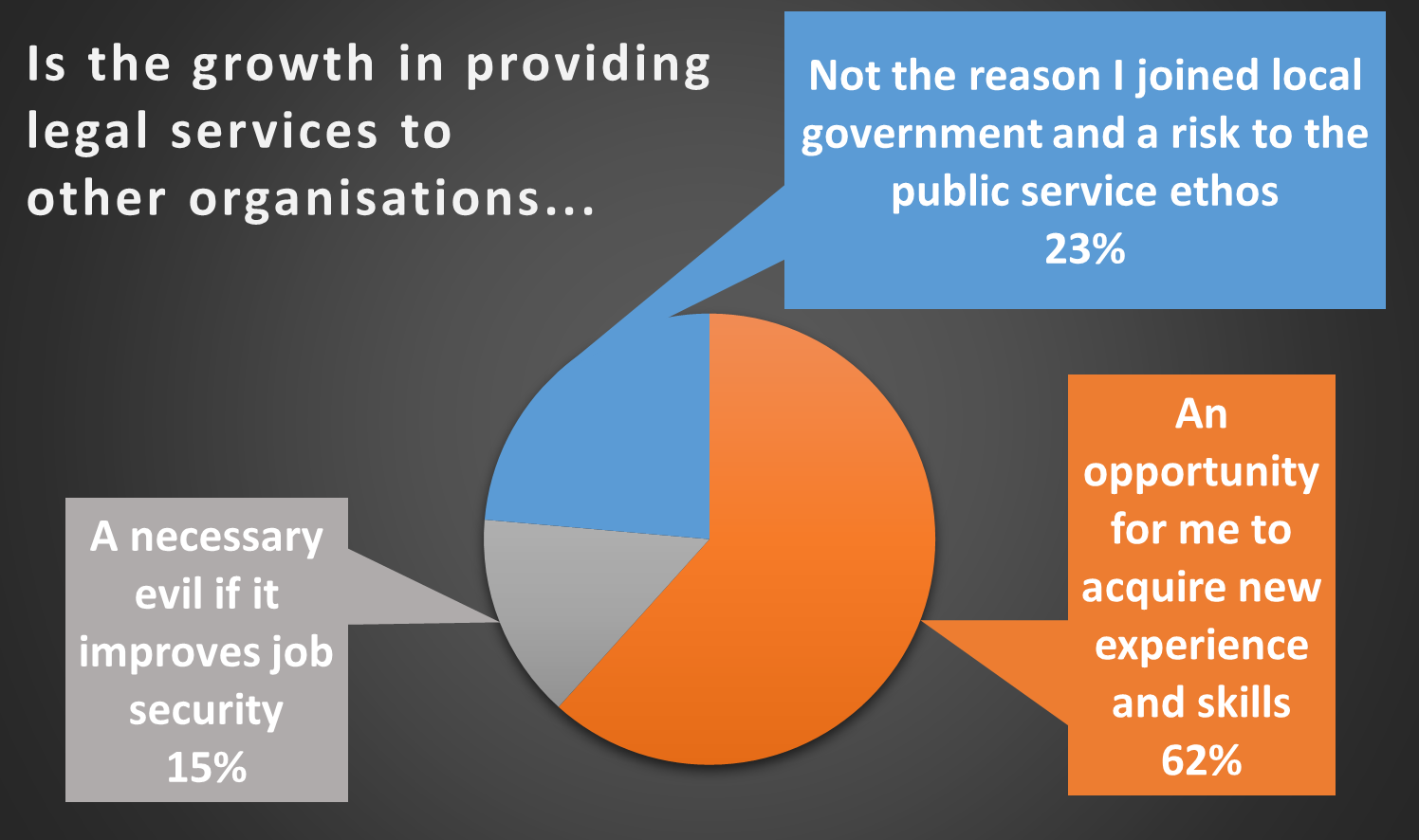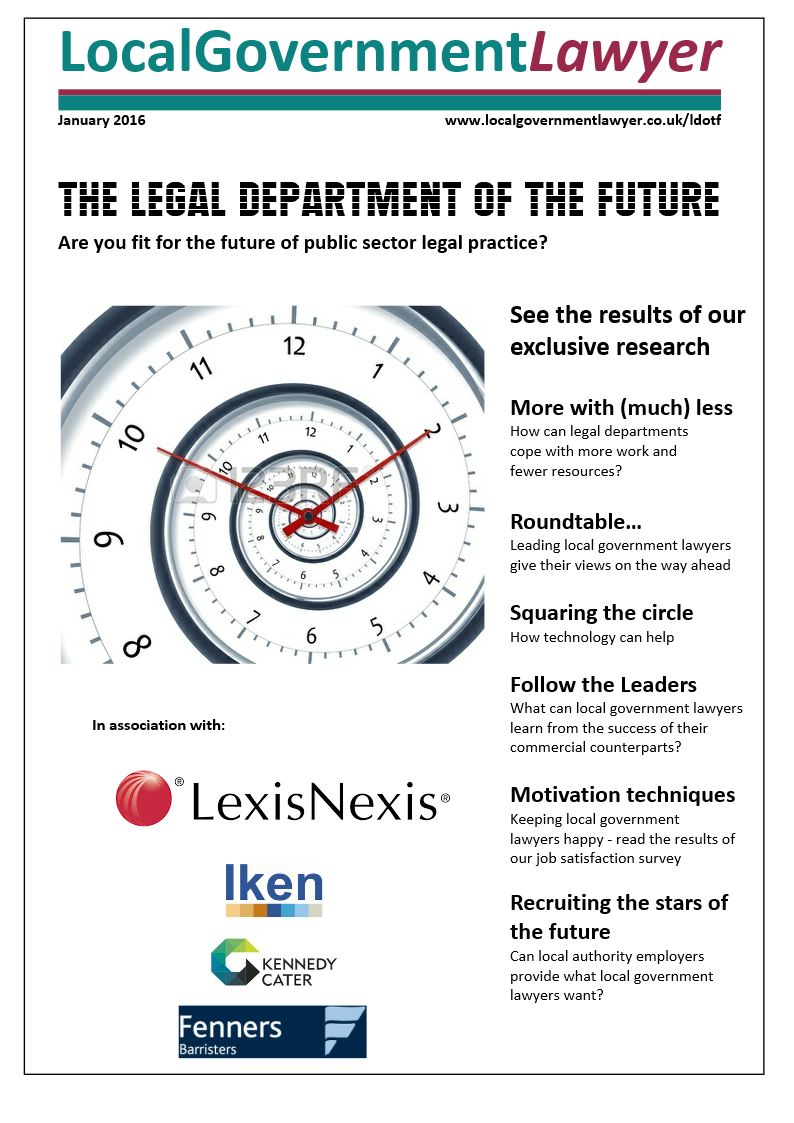- Details
Can’t get no satisfaction?
What effect have the cuts had on local government lawyers’ ambitions and morale? Derek Bedlow looks at the results of our exclusive survey of more than 300 local government lawyers and assesses the implications for local authority legal teams.

These have been tough times for local government employees and while in-house lawyers have (overall) not been affected by job cuts to the extent of other staff, they have not been spared the effects of austerity on their working lives.
As the accompanying survey of legal department management has shown, the demands on local authority legal departments are growing fast – and keeping the best lawyers on board and motivated is essential to meet the growth in legal work.
However, the results of this survey, and the comparison with its last iteration in 2013, show that there are some serious concerns for legal department management if they are to retain, recruit and maximise the potential of their lawyers.
Firstly, lawyers were asked to rate – on a scale of one-to-10 – their general levels of satisfaction with a number of key aspects of their working lives (see fig 1 below).
What the results show is that while, generally speaking, happiness with working life has npt changed significantly in the past two years, there are clear areas of concern for the future.
The good – what do local government lawyers like about their jobs?
As the responses to the satisfaction question show, two aspects of life in local authority legal departments stand out for most lawyers – quality of work and (despite some comments about increasing workloads) work-life balance. Quality of work attracted an average score of 7.1 out of 10 and work-life balance 6.7, although happiness with both has fallen since this survey was last conducted in 2013, when these two categories scored 7.4 and 7.0 respectively.
Despite the pay freeze since 2010, satisfaction with pay and pension has remained steady since 2013 at 6.3 out of 10 (it was 6.2 in 2013) while lawyers’ view of the culture and collegiality of their teams has improved slightly over the past two years to score 6.2 (from 6.0).
To add some context to the statistics, participants were also asked open-ended questions about the best and worst aspects of working as lawyers in local government.
The statistical results of the satisfaction question were borne out by the open-ended comments received.
The weight of comments cite the main advantages of a local government career being work-life balance and annual leave entitlement (although some questioned whether this would continue to be the case), pension, the quality and variety of the work, the collegiality of their teams and wider councils and the opportunity to work for the benefit of the community.
Some of the comments included:
● “The work is always challenging as we often have to interpret and navigate central government initiatives before central government have even thought about how initiatives work in practice.”
● “The pay is pretty good, and the conditions not too bad, although they have suffered some hits in recent years. Now things are recovering. The ability to learn about areas of law first hand which are not available in private practice.”
● "Good working team, quality work which can significantly benefit the city and region, altruistic rather than profit orientated ethos.”
● “Working for a local authority does still carry with it a feeling that you are doing something for the community.”
● “I really appreciate flexi time and the ability to buy back leave.”
● “Working for an organisation providing you with a much better understanding of the pressure and desires of the client which provides an ability to respond faster, more comprehensively and in a more rounded manner to client needs.”
● “[Working in local government is like] being a spectator to the experience of politics, plotting and intrigue - like Game of Thrones without the decapitation!”
The bad – what don’t local government lawyers like about their jobs?
A range of issues struggle to score more than five out of 10, including the manageability of workload (5.8), the quality of leadership (5.6), job security (5.4), IT and research facilities and professional development opportunities (both scoring 5.3, compared with 5.6 and 5.5 respectively in 2013).
Unsurprisingly, there were many responses to the question of the worst aspects of working in local government, many of which are directly related of the funding cuts affecting local government. Chief amongst these is the erosion of support services and facilities in many offices which, some respondents say, are diminishing the efficiency of legal teams while cuts to client departments are also having the effect of pushing work towards lawyers that could be more done more cost-effectively elsewhere.
“Declining funding means more and more admin being done by the lawyers, which is less cost-efficient and leads to the wrong people doing the wrong jobs – a false economy,” says one. “A lack of staff in client departments means that clients try to push their jobs on to the lawyers.”
Meanwhile open-plan offices and, especially, hot-desking attract quite a lot of criticism. “I resent working in a call centre environment with an unseemly early morning scramble for desks which indirectly discriminates against employees with primary child care responsibilities.”
Job security is also a worry for many as is the frequent reorganisation to which some departments have been subjected. The list of woes felt by many respondents is summed up by one who observes: “Over the last years the workload has dramatically increased and through a combination of cuts to the legal service itself as well as to client departments the pressure of the job has become much more telling; the workload and pressure is becoming closer and closer to that experienced in private practice with working hours far exceeding contracted hours but with little incentive or reward to actually undertake the additional strain. Whilst workload and pressure has become, and continues to become, far closer aligned to commercial practice, the financial rewards have remained at very much public sector levels causing ever increasing dissatisfaction with work-life balance and general job satisfaction.”
More fundamentally, responses to this question picked up widespread concern about the diminishing status of local government in the public eye, and its effects. “There is the general feeling that the current Government thinks very little of local government generally,” says one. “This does affect one of the rewards of working for a local authority which is that feeling of doing something worthwhile for the community. The lack of funding is now starting to have an impact with funding for future investment in the fabric of the council and also the community now being very hard to find.”
The status of legal teams within their authorities is similarly a source of some concern for many local government lawyers. "There is an increasing lack of respect for the worth and value of legal within the authority,” says one respondent. “In our authority, legal are not even part of the executive management team and local government employment structures do not recognise professional experience in their pay and grading."
The survey also asked respondents how they thought that their departments are perceived by clients. This found a clear majority – 68% – who still feel that their departments are seen as “trusted advisers” by their authorities, compared with 18% who think they are regarded as a “roadblock” and 14% who felt they are regarded as being a “remote service department”.
The open-ended comments on this question are more nuanced, with the answer in some cases depending on which client department, and which lawyer, is being considered, as a number of respondents point out.
"Certain departments see us as trusted adviser; others see us as a barrier. Certain clients do not understand that early use of legal services is likely to be helpful and cost effective and that bringing in legal services early is more likely to lead to problems being detected when it is difficult to address them properly without causing additional cost or delay," says one.
“Some departments seek guidance and assistance all the time – others keep us in dark until the last possible moment, which goes some way to fulfilling their assumption that we are obstructive,” says another.
As well as creating more work for in-house lawyers, the hollowing out of many client departments is also affecting the relationship between lawyer and client in many cases, with the latter often described as failing to appreciate the nature and boundaries of the lawyer/client relationship. Coping with the loss of experience in instructing parts of the council is identified as a key challenge by heads of legal in the management survey and it is an issue that that causes concern at the coalface as well.
“Clients are becoming increasingly (passive) aggressive if they do not receive the advice they want, and generally the decline in quality of instructions and personnel left within the organisation is a real problem,” says one respondent.
“Clients need to appreciate a professional service is being provided and that lawyers have codes of conduct to comply with and regulatory pressures,” says another.
“Outsourcing is a much more expensive option than an efficient and professional in-house service. Client departments must be made to understand they have to do the admin and non-legal work to allow the lawyers to do the legal work.”
…and the ugly – a career cul-de-sac
By some distance, the lowest satisfaction ratings were recorded in respect of career prospects, which scored just 4.3 out of 10.
Respondents were also asked what their career aims were (see fig 2), and this question recorded a sharp drop since 2013 in the proportion of lawyers looking to move up into management (from 44% to 36%) and a concomitant rise in the number of local government lawyers happy to stay at their present levels, which rose from 28% when this survey was first taken in 2013 to 32%. “It is OK to work in local government if you just want a job, but not if you would like a career,” one respondent concludes.
 The reasons cited for this by respondents include the reduction in the number of management positions due to the creation of shared services teams and the reduction in layers of management at local authorities in general.
The reasons cited for this by respondents include the reduction in the number of management positions due to the creation of shared services teams and the reduction in layers of management at local authorities in general.
It is not a situation that is likely to improve in the near future as, according to the results of the management survey, the number of senior roles is predicted to fall in future as senior lawyers make way for junior and part- or non-qualified staff. This process has not gone unnoticed by staff: “Experience does not appear to count for much, and although older more experienced staff were valued, now it appears that the council wants younger staff,” one respondent says. “The mid-point experienced/qualified staff are being overlooked and the more mature staff are retiring, leaving a large gap.”
There increasingly seems to be a view in some quarters that working in local government is a great opportunity for lawyers at the beginning of their careers but that the career opportunities and pay make it much less attractive in the long term. “Local government is a great option as a first step to gain high-level experience pre- and immediately post- qualification. I would advise the person to take that experience into an environment where it is valued (including financially) and given the respect it is due,” says one respondent.
Talk is cheap
There is an appreciation amongst most respondents that the capacity of management to address many of the issues identified is limited in the current environment but nevertheless, the question of “What steps could your employer take to improve the working environment for you?” elicited a wide number of responses.
Many of these are around improvements to the office environment (“working in open plan is like being a galley slave without the drums,” says one), facilities and support and – commonly – dealing with under-performing colleagues. As one respondent notes: “There need to be more performance management standards enforced and those who do not deliver need to be questioned about it.”
The greatest weight of comments, however, appeal for better communication from management, both within the department and above. Time and again, respondents complain that they are being kept in the dark about changes to their teams, while others say that the lack of encouragement and appreciation from management can be extremely de-motivating.
“[Managers should be] valuing good employees rather than making them feel they are dispensable,” says one lawyer. “Our section has lost two excellent lawyers because they don't feel valued and is about to lose another, but management is becoming more remote.”

Are local government lawyers special?
Another theme that emerges from various points of the survey is the desire for specialist legal skills to be recognised in grading terms as well as management skills. A large number of comments bemoan the fact that promotion and status can only be achieved by taking on more management responsibilities rather than through the development of high-level expertise in a given field of law, a comment being that “the only chance of promotion or a pay rise involves managerial tasks and less opportunity for quality legal work. There is no reward for experience or dealing with a high complexity workload.”
At face value, promoting people based on their expertise would seem to be an unnecessary expense, yet in some areas management complain that they can only resource key areas such as procurement or planning through the use of expensive locum staff or by going out to private practice, so the development of more specialist in-house practitioners (perhaps in conjunction with other authorities) would seem to be a win-win situation.

The expense of using locums or private practice could be reduced whilst the career development prospects for many lawyers would be enhanced. Yet at the moment, there appears to be a vicious circle of higher value work being sent out for lack of internal capability, thereby denying the opportunity for in-house staff to develop the appropriate skills and experience.
“Due to limited resources, big, time-consuming projects can be outsourced as there may be limited capacity to deal with them in-house,” suggests one respondent. “These should be retained as they are interesting, offer a chance to develop skills and enable lawyers to deal with similar projects in the future.”
Such an initiative would potentially find a receptive audience. The survey went on to ask respondents whether they would prefer to be specialist or generalist lawyers – 58% say that they would prefer to be specialist, 22% generalist with the remaining 20% expressing no preference. “The law is now so complex and fast-moving that the old generalist will disappear,” says one in-house lawyer. “Clients appear to have more confidence in the advice given by specialist lawyers,” says another.
That said, the variety of work offered by local authority legal departments remains a significant attraction and the dilemma facing local government lawyers in this respect is succinctly summed up by one survey participant as follows: “The variety of local government work is the main reason for my job satisfaction and desire to remain in the sector. This is, however, balanced by the desire to have more certainty in having a specialism allowing you to provide more comprehensive advice in a faster and more direct manner. This pressure becomes more telling as further cuts take place resulting in clients referring issues for legal advice at a more crucial point than would otherwise have been the case.”
Shared services
Given the potential demand for more specialist services from an individual authority is likely to be weak, then the obvious place to develop more specialist roles would be within shared teams. Moreover, if this was to enable an alternative career path for local government lawyers then that may also create some enthusiasm for shared services which is lacking at the moment.
Most lawyers seem resigned to the growth of shared services rather than enthusiastic about them. The proportion of lawyers expecting to be part of a shared service in future has jumped from 21% to 31% on just two years, but they are still a turn-off for a significant minority of local government lawyers, 28% of whom say that they would be less likely to apply for a job in a shared services department, compared with just 7% who would be more likely to.
“There needs to be more communication as to what the benefits are of a shared service as the majority of staff are struggling to see the benefits,” says one respondent.
When asked what effect being employed in a shared services department has on key aspects of lawyers’ working lives and careers, a majority are positive about the effect on the quality and variety of the work they do and career development and training prospects and neutral on the impact on support and facilities, job security, culture and (perhaps surprisingly) on their relationship with their clients. A small majority are negative about the effect of shared services on pay and conditions and a large majority think that working in a shared services team will have a negative impact on the manageability of their workloads and the location of their offices.
“The experience is very different from working for one authority or even two,” says one employee of a shared service. “Once you move above that the dynamics are different and the cultural variations between your clients is very significant. A large shared service is both the best and the worst place to work in times of austerity.”
Trading out of trouble
There is more positivity amongst in-house lawyers about working in a department offering external legal services, however. When asked about their attitudes towards working for external clients, 62% agree with the statement that “the growth in providing legal services to other organisations is an opportunity for me to acquire new experience and skills” compared with 24% who agree with the statement that it was “not the reason I joined local government and a risk to the public sector ethos”. The remaining 14% agree that it is a “necessary evil if it improves job security”.

Meanwhile, and in contrast to the prospect of working in a shared services department, almost as many respondents (19%) say they would be more likely to apply for a job in a team with a high number of external clients as the number that would be less likely (25%).
As well as providing more experience for local government lawyers, the development of trading is also described by some respondents as a way for legal departments to raise their profiles within their authorities and provide better job security. On balance, however, the welcome for external clients is a cautious one. There are widespread concerns that too many external clients will raise workloads to unmanageable levels and there are a few caveats expressed, especially around the prioritisation of work between in-house departments and external clients. Others are sceptical that their departments can make trading work from a marketing and practice management perspective.
“Provided those other organisations are non-profit making or public sector bodies, it is good if local government lawyers can provide their legal services at cost rather than those bodies having to pay for the inflated profits of partners in large private practice commercial firms,” says one. “The problem is when local government sees providing services to other organisations as a way to generate income rather than a sensible use of surplus capacity (or a reason to hire additional capacity).”
Why does it matter?
Many local authority lawyers have significant concerns about key aspects of their working lives, in particular the perceived lack of career prospects, and the link between morale, motivation and productivity is well established. Poor working conditions can also have an adverse effect on recruitment and retention, especially at a time when demand is rising and competition for staff from private practice is acute in many areas. As the demand for local government lawyers increases, respondents to the management survey report that recruitment is already difficult and set to get harder still.
As a respondent to the management survey says: “I feel very worried when I see a general dumbing down or statistics which seems to suggest that some of our lawyers are just coasting because they don’t see any promotion prospects or a career in local government.”
There are no obviously simple solutions, although the request for more information and transparency about forthcoming changes is relatively cost-free. In time, the development of more senior specialist roles could also be self-financing in the longer-term if they reduce the dependency on law firms or locums.
The good news at least is that there remains a significant commitment to working in local government amongst in-house practitioners. Despite all the challenges they face, a substantial majority of in-house lawyers – 70% – would still recommend local government as a career and a slightly higher proportion, 72%, would recommend their own departments as a place to work. These figures are lower than the figures recorded in the equivalent survey taken in 2013 (when 77% said they would recommend a career in local government), but they demonstrate a willingness amongst the majority of local government lawyers to stick with the sector even in these difficult times.
“There are still many positives to working for a local authority,” one in-house lawyer concludes. “It is heartening to see how local authorities are embracing change to meet the challenges whilst still maintaining that local authority ethos.”
Derek Bedlow is the publisher of Local Government Lawyer.

This article appeared in the Legal Department of the Future report, published in February 2016. To read or download the full report, please click on the following link: http://www.localgovernmentlawyer.co.uk/ldotf/
Head of Legal
Child Care Lawyer
Legal Director - Government and Public Sector
Solicitor - Civil and Criminal Litigation
Litgation Solicitor
Commercial Lawyer
Solicitor - Contracts and Procurement
Solicitor - Civil and Criminal Litigation
Locum roles
 Cornerstone Barristers roundtable on the Draft NPPF: Plan-Making Provisions
Cornerstone Barristers roundtable on the Draft NPPF: Plan-Making Provisions
09-02-2026 2:00 pm
London
 Breakfast Briefing – Commonhold & Leasehold Reform Bill – a session focusing on the key themes of the Bill and the Consultation on Banning Leasehold for New Flats - Devonshires
Breakfast Briefing – Commonhold & Leasehold Reform Bill – a session focusing on the key themes of the Bill and the Consultation on Banning Leasehold for New Flats - Devonshires
12-02-2026 8:30 am
London
 Planning, Property and Power Webinar Series: Strategic energy planning - Landmark Chambers
Planning, Property and Power Webinar Series: Strategic energy planning - Landmark Chambers
12-02-2026 10:00 am
Online (live)
 Public Sector Insights – NHS Continuing Healthcare (CHC) in Wales - Blake Morgan
Public Sector Insights – NHS Continuing Healthcare (CHC) in Wales - Blake Morgan
12-02-2026 10:00 am
Online (live)
 InLaws workshop – Effective Communicating and Influencing - Devonshires
InLaws workshop – Effective Communicating and Influencing - Devonshires
12-02-2026 2:00 pm
Online (live)
 HMPL Building Blocks: Legal Tools to Combat Anti-Social Behaviour - Devonshires
HMPL Building Blocks: Legal Tools to Combat Anti-Social Behaviour - Devonshires
17-02-2026
Online (live)
 Data Controller, Processor or Joint Controller: What am I? - Act Now
Data Controller, Processor or Joint Controller: What am I? - Act Now
18-02-2026 10:00 am
Online (live)
 Freedom of thought, belief and religion: Article 9 ECHR - Francis Taylor Building
Freedom of thought, belief and religion: Article 9 ECHR - Francis Taylor Building
19-02-2026
Online (live)
 AI and Information Governance: Bridging Innovation and Compliance - Act Now
AI and Information Governance: Bridging Innovation and Compliance - Act Now
19-02-2026 10:00 am
Online (live)
 Safeguarding Issues and Fairness in Investigations and Hearings - 3PB
Safeguarding Issues and Fairness in Investigations and Hearings - 3PB
24-02-2026 11:00 am
Online (live)
 Children and Young People (DoL, Competency and Capacity) - Peter Edwards Law Training
Children and Young People (DoL, Competency and Capacity) - Peter Edwards Law Training
25-02-2026
Online (live)
























































































































 The General Data Protection Regulation - Act Now
The General Data Protection Regulation - Act Now  Interveners in financial remedy proceedings - 42BR
Interveners in financial remedy proceedings - 42BR  The Procurement Act - One Year On - DWF
The Procurement Act - One Year On - DWF  The ERA – An Overview - Sharpe Pritchard
The ERA – An Overview - Sharpe Pritchard  Short Term Lets - Ivy Legal
Short Term Lets - Ivy Legal 